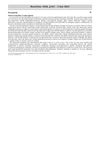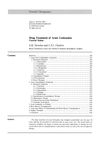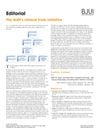4 citations,
April 2020 in “Reports of Practical Oncology & Radiotherapy” Prostate cancer patients need early psychological and sexual support during radiotherapy to improve their quality of life.
 April 2017 in “Reactions Weekly”
April 2017 in “Reactions Weekly” Man experienced sexual dysfunction, depression, breast growth, and skin discoloration after taking finasteride for hair loss.
 35 citations,
January 2012 in “The Journal of Sexual Medicine”
35 citations,
January 2012 in “The Journal of Sexual Medicine” Androgen Deprivation Therapy for prostate cancer often reduces sexual function but intermittent therapy may be more tolerable.
 13 citations,
July 2019 in “Pediatric dermatology”
13 citations,
July 2019 in “Pediatric dermatology” Pediatric dermatologists need to understand the unique skin health needs of LGBTQIA youth to provide better care.
 228 citations,
February 2003 in “Urology”
228 citations,
February 2003 in “Urology” Androgen deprivation therapy for prostate cancer can cause sexual, physical, and psychological side effects, and doctors should manage these carefully.
 June 2021 in “Reactions Weekly”
June 2021 in “Reactions Weekly” Finasteride caused serious side effects and led to six suicides.
 November 2020 in “Reactions Weekly”
November 2020 in “Reactions Weekly” Finasteride can cause lasting erectile dysfunction, low libido, and depression in some patients.
 7 citations,
September 2023 in “Cancer Treatment Reviews”
7 citations,
September 2023 in “Cancer Treatment Reviews” Managing side effects of endocrine therapy is crucial to improve adherence and survival in breast cancer patients.
 9 citations,
May 2008 in “Journal of Clinical Oncology”
9 citations,
May 2008 in “Journal of Clinical Oncology” A woman's ovarian tumor causing high testosterone was successfully removed, and her symptoms improved.
 9 citations,
January 2014 in “DARU Journal of Pharmaceutical Sciences”
9 citations,
January 2014 in “DARU Journal of Pharmaceutical Sciences” Cuscuta reflexa extracts helped regrow hair in rats with drug-induced hair loss.
29 citations,
February 2019 in “Environment international” Higher early lead exposure is linked to delayed puberty in girls.
 3 citations,
February 2023 in “ACS omega”
3 citations,
February 2023 in “ACS omega” Grape seed oil improved hair quality the most, followed by rosehip and safflower seed oils, and reduced damage from shampoo.

Treatments for acute leukaemia lead to high remission rates, but relapses occur, requiring ongoing advancements in care.
 77 citations,
June 2015 in “Nature Reviews Urology”
77 citations,
June 2015 in “Nature Reviews Urology” Some common medications can harm male fertility, but many effects can be reversed.
 9 citations,
December 2022 in “Phytomedicine”
9 citations,
December 2022 in “Phytomedicine” More high-quality research is needed to recommend flavonoids and saponins for clinical use.
 November 2019 in “Harper's Textbook of Pediatric Dermatology”
November 2019 in “Harper's Textbook of Pediatric Dermatology” The document is a detailed medical reference on skin and genetic disorders.
 29 citations,
October 1988 in “Journal of Steroid Biochemistry”
29 citations,
October 1988 in “Journal of Steroid Biochemistry” Antiandrogens are effective for conditions like prostate cancer and skin issues, but more research is needed to confirm their benefits and minimize side effects.
 14 citations,
March 2022 in “Journal of Biomedical Science”
14 citations,
March 2022 in “Journal of Biomedical Science” Cyanidin 3-O-arabinoside may help treat a common form of hair loss by protecting cells against aging and improving cell function.
 28 citations,
January 2003 in “Urologic oncology”
28 citations,
January 2003 in “Urologic oncology” Suppressing certain hormones might help prevent prostate cancer.
 26 citations,
April 2019 in “Journal of Cosmetic Dermatology”
26 citations,
April 2019 in “Journal of Cosmetic Dermatology” Herbal alternatives like saw palmetto and green tea may offer safe, effective treatment for hormonal hair loss.
 40 citations,
September 2019 in “Molecular and Cellular Endocrinology”
40 citations,
September 2019 in “Molecular and Cellular Endocrinology” Group a wide range of chemicals, not just phthalates, for assessing risks to male reproductive health.
 159 citations,
September 2001 in “European Journal of Cancer Care”
159 citations,
September 2001 in “European Journal of Cancer Care” Chemotherapy-induced hair loss significantly affects patients' well-being, and nurses are key in helping them cope, but more research is needed to find effective treatments.
 54 citations,
January 2013 in “BMC Complementary and Alternative Medicine”
54 citations,
January 2013 in “BMC Complementary and Alternative Medicine” Thuja orientalis hot water extract may help hair grow by starting the growth phase and improving hair follicle development.
 3 citations,
February 2017 in “Archives of Medical Science”
3 citations,
February 2017 in “Archives of Medical Science” Finasteride treatment changes Cx43 in rat testes, possibly causing fertility issues.

Treatments for hair loss vary, but cell-based options may be the future.
 January 2021 in “Middle East journal of applied sciences”
January 2021 in “Middle East journal of applied sciences” Zinc is essential for plant growth and human health, but many soils lack enough zinc, affecting crops and potentially leading to health problems.
 March 2017 in “BJU international”
March 2017 in “BJU international” The BJUI supports clinical trials as key for unbiased medical evidence and works to enhance their design, reporting, and discussion.
 19 citations,
November 2018 in “Nutrients”
19 citations,
November 2018 in “Nutrients” Annurca apple extract may protect mouse hair from damage by chemotherapy and could help treat hair loss without promoting cancer growth.
6 citations,
June 2023 in “American Society of Clinical Oncology Educational Book” Cannabis, cryotherapy, and scalp cooling can help improve the quality of life for chemotherapy patients.
2 citations,
April 2021 in “Asian pacific Journal of Tropical Biomedicine” Origanum vulgare leaf extract reduces liver and kidney damage caused by finasteride in mice.

























